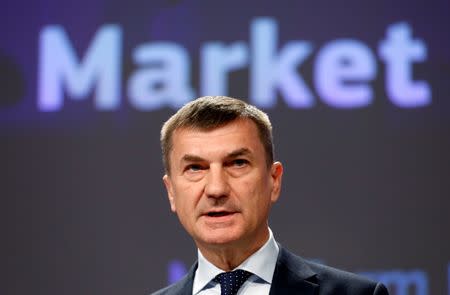Europe should be wary of Huawei, EU tech official says

By Francesco Guarascio and Foo Yun Chee
BRUSSELS (Reuters) - The European Union should be worried about Huawei [HWT.UL] and other Chinese technology companies because of the risk they pose to the bloc's industry and security, the EU's technology chief said on Friday, echoing concerns raised elsewhere in the world.
Huawei expressed disappointment at EU tech commissioner Andrus Ansip's comments, saying it had never been asked to install technology that could be used for spying and never would.
"Do we have to be worried about Huawei or other Chinese companies? Yes, I think we have to be worried about those companies," Ansip told a news conference in Brussels, days after a top executive at Huawei was arrested in Canada as part of an investigation into alleged bank fraud.
Huawei, which generated $93 billion (72.85 billion pounds) in revenue last year and is seen as a national champion in China, faces intense scrutiny from many Western nations over its ties to China's government.
Ansip said he was concerned because Chinese technology companies were required to cooperate with Chinese intelligence services, such as on "mandatory back doors" to allow access to encrypted data.
He also said the companies produced chips that could be used "to get our secrets".
"As normal, ordinary people we have to be afraid," he said, adding he did not have enough information about the recent arrest in Canada.
Huawei called such comments misunderstandings and denied it posed a security threat.
"Huawei has never been asked by any government to build any backdoors or interrupt any networks, and we would never tolerate such behaviour by any of our staff," the company said in a statement.
"Cyber security needs to be addressed jointly at a global level, and equipment vendors should not be treated differently based on their country of origin. Singling out one vendor does nothing to help the industry identify and address cyber security threats more effectively," it said.
Separately, sources with knowledge of the matter said on Friday Huawei would spend $2 billion as part of efforts to address security issues raised in a British government report earlier this year.
Germany, meanwhile, said it opposed excluding any manufacturers from the planned construction of 5G mobile networks.
However, Belgian newspapers L'Echo and De Tijd reported the country's centre for cybersecurity was considering the possibility of banning Huawei in Belgium. The company supplies equipment to telecom providers Proximus <PROX.BR> and Orange Belgium <OBEL.BR>.
The centre was not immediately reachable for comment.
The EU as a whole is braced to launch a far-reaching system to coordinate scrutiny of foreign investments into Europe following a surge of Chinese investments and concerns about security and forced technology transfer.
However, the arrest in Canada of Huawei chief financial officer Meng Wanzhou relates to a U.S. investigation into an alleged scheme to use the global banking system to evade U.S. sanctions against Iran, people familiar with the probe told Reuters.
Europeans too could potentially face prosecution in the United States, which has withdrawn from an agreement with Iran on its nuclear programme. Reimposed U.S. sanctions have already forced many European companies to stop trading with Iran.
Meng was due to appear in a court on Friday as she awaits a possible extradition to the United States.
(Reporting by Francesco Guarascio, Foo Yun Chee and Philip Blenkinsop; Editing by Mark Potter)

 Yahoo Finance
Yahoo Finance 